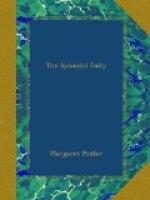“You’ll go away from Crailing?” she asked nervously.
He smiled a little sadly.
“Yes, I’ll go away. I’ll leave you quite free to make your decision,” he replied.
She breathed a sigh of relief. She knew that if he were to remain at Crailing, if they were to continue seeing each other almost daily, there could be but one end to the matter—her conviction that no happiness could result from such a marriage would go by the board. It could not stand against the breathless impetuosity of Max’s love-making—not when her own heart was eager and aching to respond.
“Thank you, Max,” she said simply, extending her hand.
He put it aside, drawing her into his embrace.
“Beloved,” he said, and now there was no passion, no fierceness of desire in his voice, only unutterable tenderness. “Beloved, please God you will find it in your heart to be good to me. All my thoughts are yours, but for that one thing over which I need your faith. . . . I think no man ever loved a woman so utterly as I love you. And oh! little white English rose of my heart, I’d never ask more than you could give. Love isn’t all passion. It’s tenderness and shielding and service, dear, as well as fire and flame. A man loves his wife in all the little ways of daily life as well as in the big ways of eternity.”
He stooped his head, and a shaft of sunlight flickered across his bright hair. Diana watched it with a curious sense of detachment. Very gently he laid her hands against his lips, and the next moment he was swinging away from her across the stretch of yellow sand, leaving her alone once more with the sea and the sky and the wheeling gulls.
CHAPTER XV
DIANA’S DECISION
Max had been gone a week—a week of distress and miserable indecision for Diana, racked as she was between her love and her conviction that marriage under the only circumstances possible would inevitably bring unhappiness. Over and above this fear there was the instinctive recoil she felt from Errington’s demand for such blind faith. Her pride rebelled against it. If he loved her and had confidence in her, why couldn’t he trust her with his secret? It was treating her like a child, and it would be wrong—all wrong—she argued, to begin their married life with concealment and secrecy for its foundation.
One morning she even wrote to him, telling him definitely either that he must trust her altogether, or that they must part irrevocably. But the letter was torn up the same afternoon, and Diana went to bed that night with her decision still untaken.
For several nights she had slept but little, and once again she passed long hours tossing feverishly from side to side of the bed or pacing up and down her room, love and pride fighting a stubborn battle within her. Had Max remained at Crailing, love would have gained an easy victory, but, true to his promise, he had gone away, leaving her to make her decision free and untrammelled by his influence.




